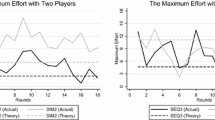Abstract
We introduce the serial contest by building on the desirable properties of two prominent contest games. This family of contest games relies both on relative efforts (as Tullock’s proposal) and on absolute effort differences (as difference-form contests). An additional desirable feature is that the serial contest is homogeneous of degree zero in contestants’ efforts. The family is characterized by a parameter representing how sensitive the outcome is to contestants’ efforts. It encompasses as polar cases the (fair) lottery and the (deterministic) all-pay auction. Equilibria have a close relationship to those of the (deterministic) all-pay auction and important properties of the latter hold for the serial contest, too.
Similar content being viewed by others
References
Alcalde J, Dahm M (2007) All-pay auction equilibria in contests (unpublished)
Alesina A, Spolaore E (2005) Conflict, defense, and the number of nations. Eur Econ Rev 50(1):91–120
Baik KH (1998) Difference-form contest success functions and effort levels in contests. Eur J Polit Econ 14:685–701
Baron D, Diermeier D (2007) Strategic activism and nonmarket strategy. J Econ Manag Strategy (in press)
Baye MR, Kovenock D, de Vries CG (1993) Rigging the lobbying process: an application of the all-pay auction. Am Econ Rev 83(1):289–294
Baye MR, Kovenock D, de Vries CG (1994) The solution to the tullock rent-seeking game when R > 2: mixed strategy equilibria and mean dissipation rates. Public Choice 81:363–380
Baye MR, Kovenock D, de Vries CG (1996) The all-pay auction with complete information. Econ Theory 8:291–305
Che Y-K, Gale I (1998) Caps on political lobbying. Am Econ Rev 88(3):643–651
Che Y-K, Gale I (2000) Difference-form contests and the robustness of all-pay auctions. Games Econ Behav 30:22–43
Dagan N (1996) New characterizations of old bankruptcy rules. Soc Choice Welf 13:51–59
Dasgupta P, Maskin E (1986) The existence of equilibrium in discontinuous economic games, I and II. Rev Econ Stud 53:1–26, 27–41
Fang H (2002) Lottery versus all-pay auction models of lobbying. Public Choice 112:351–371
Hillman AL, Riley JG (1989) Politically contestable rents and transfers. Econ Polit 1:17–40
Hirshleifer J (1989) Conflict and rent-seeking success functions: ratio vs difference models of relative success. Public Choice 63:101–112
Hirshleifer J (2000) The macrotechnology of conflict. J Conflict Resolut 44(6):773–792
Konrad KA (2000a) Trade contests. J Int Econ 51(2):317–334
Konrad KA (2000b) Spatial contests. Int J Ind Organ 18(6):965–974
Konrad KA (2007) Strategy in contests—an introduction. November 16, (unpublished) WZB Discussion Paper SP II 2007–01
Littlechild SC, Owen G (1973) A simple expression for the Shapley value in a special case. Manag Sci 20(3):370–372
Malueg DA, Yates AJ (2006) Equilibria in rent-seeking contests with homogeneous success functions. Econ Theory 27:719–727
Moulin H, Shenker S (1992) Serial cost sharing. Econometrica 60(5):1009–1037
Nitzan S (1994) Modelling rent-seeking contests. Eur J Pol Econ 10:41–60
Pérez-Castrillo D, Verdier T (1992) A general analysis of rent-seeking games. Public Choice 73:335–350
Polborn MK, Klumpp T (2006) Primaries and the new Hampshire effect. J Public Econ 90(6–7):1073–1114
Riley JG (1999) Asymmetric contests: a resolution of the Tullock paradox. In: Howitt P, De Antoni E, Leijonhuvud A (eds) Money, markets and method: essays in honor of Robert Clower, Cheltenham. E. Elgar Pub., Northampton, pp 190–207
Skaderpas S (1996) Contest success functions. Econ Theory 7:283–290
Tullock G (1980). Efficient rent seeking. In: Buchanan J, Tollison R, Tullock G (eds) Toward a theory of the rentseeking society. A&M University Press, College Station, pp 97–112
Author information
Authors and Affiliations
Corresponding author
Rights and permissions
About this article
Cite this article
Alcalde, J., Dahm, M. Tullock and Hirshleifer: a meeting of the minds. Rev. Econ. Design 11, 101–124 (2007). https://doi.org/10.1007/s10058-007-0031-6
Published:
Issue Date:
DOI: https://doi.org/10.1007/s10058-007-0031-6
Keywords
- Rent-seeking
- (Non-)deterministic contest
- Contest success function
- All-pay auction
- Rent dissipation
- Exclusion principle
- Preemption effect
- Cap
- Campaign contributions




